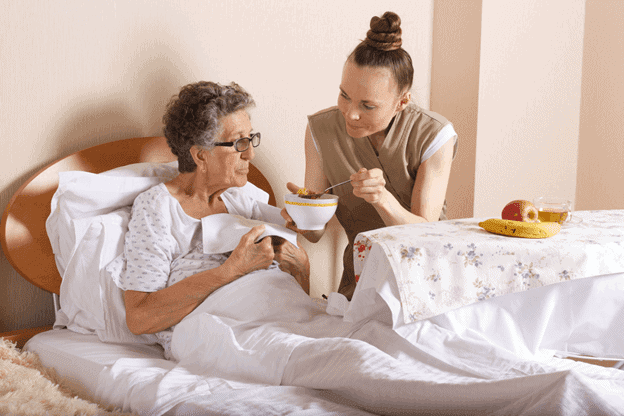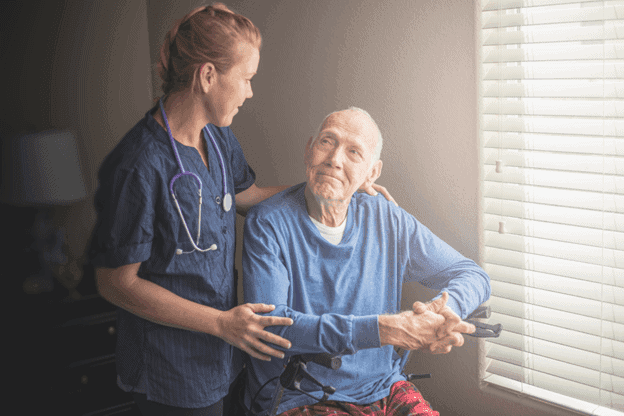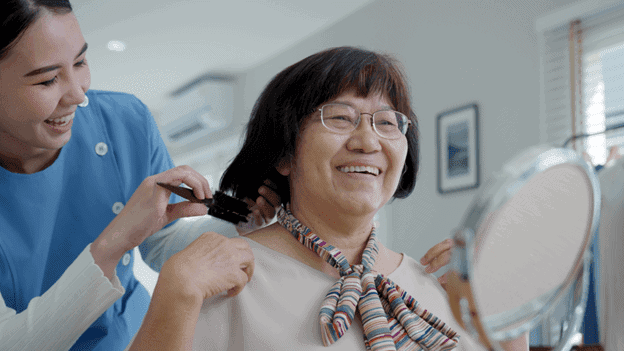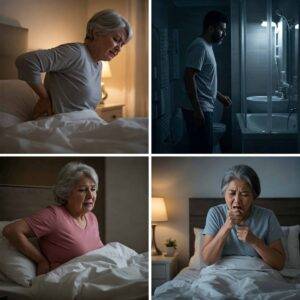
It can be tough seeing your loved one struggle with performing basic activities such as getting out of bed, eating, taking a bath, using the toilet, preparing meals, or making the bed.
The good news is, instead of moving to an overly large assisted living facility — especially when they want to stay at home for as long as possible, assisted living can be provided from the comfort of their home.
In-home assisted living offers seniors the opportunity to retain their independence while receiving care at home.
What is In-Home Assisted Living?
In-home assisted living parallels the care provided at assisted living facilities. The only difference is that such care is provided at home.
In-home assisted living falls under the umbrella of in-home care services and is provided to seniors who require help with daily care, to enable them to continue to age safely at home.
These services include
- Assistance with personal care including eating, bathing, grooming, and transferring
- Housekeeping and laundry
- Meal preparation
- Medication reminders and monitoring
- Transportation
- Companionship and recreational activities
Unlike large assisted living facilities that have a high resident-to-staff ratio, assisted living at home keeps your loved one the central focus of the caregiver, and this results in a better quality of life and care.
At Amy’s Eden, we provide in-home assisted living services, either in the client’s home or in our smaller assisted homes.
Assisted Homes
For whatever reason, a senior might not be able or wish to live in their home. Our assisted homes provide residents with a 24-hour caregiver and a welcoming in-home care environment.
Our homes typically have no more than 2 residents to enable seniors to receive the highest quality of care from our friendly and compassionate caregivers. It’s the next best option to being in their own home. Because in reality, they still are.
Depending on the care needs or preferences of the senior, we create a personalized care plan that is subject to change if the level of care required by the senior increases. We do this while the costs remain steady even when physical conditions are not.
Differences Between In Home Assisted Living and Large Assisted Living Facilities
Below are the differences between in-home assisted living and assisted living facilities
| In Home Assisted Living/Assisted Homes | Large Assisted Living Facilities |
|---|---|
| 1 or 2 Residents | 20 to 120 residents or more |
| Low resident-to-staff ratio | High resident-to-staff ratio |
| Your loved one receives personalized one-on-one care from the caregiver | Personalized one-on-once care might be difficult because of the high resident to staff ratio |
| Caregivers are more consistent | Frequent changes to staff |
| Quality of care is easily consistent | Quality of care will usually differ because of frequent staff changes and high ratio |
| Receives care from the comfort of home in a familiar environment | In a new environment, adapting to change might be difficult |
| If the level of care increases, care can be continued at home without increase in costs | If the level of care increases, facility may not provide such care, costs always increase or your loved one may need to move a higher level of services |
Determining the Level of Care Your Loved One Needs
Before you start looking for agencies that provide in-home assisted living, you might first enlist a physician’s help in assessing and understanding what your loved one needs assistance with. This will make it easier for you to identify home care agencies that are the right fit.
There are generally 3 levels of care:
Level 1 Care
This is the lowest level of care. Older adults are still fairly independent and can take care of themselves and carry out activities of daily living (ADLs). They may only require a little assistance for housekeeping, laundry, running errands, or general supervision occasionally throughout the day.
Level 2 Care
At this point, the senior may be independent in certain activities, but not in others. For instance, a senior may still be able to feed themselves, but may not remember to bathe or take their medications regularly without reminders. Here, more supervision is needed to ensure they complete their ADLs, and get help when appropriate.
Level 3 Care

This is the highest level of care for seniors suffering from chronic/terminal health conditions such as heart disease, muscle weakness, and progressive dementia or more. At this stage, their health condition almost completely makes them unable to carry out their ADLs, and as such require a high level of constant care and continuous health care monitoring and supervision.
To determine your loved one’s level of care, consider their:
- Functional needs
- Cognitive needs
- Medical and non-medical needs
- Functional Needs
Physical limitations are inevitable as one grows older. Your loved one may begin to find it difficult to perform certain routine tasks they would otherwise be able to do themselves.
Functional needs include assistance with basic activities such as dressing, grooming, mobility, eating, housekeeping, and more.
You might notice that your loved one is finding it difficult to climb the stairs or reach top shelves. In addition, you might not notice how they struggle to get out of bed especially if you don’t live with them.
As you observe certain changes in physical limitations including poor hygiene or poor nutritional habits, don’t forget to ask your loved one about basic activities they too find difficult.
-
Cognitive Needs
If your loved one lives alone, watch for signs of loneliness, mood swings, or social isolation. Also, watch out for signs of forgetfulness, and memory loss, as these could be the beginning symptoms of dementia and Alzheimer’s.
-
Medical Needs
Is your loved one suffering from an illness or condition that requires constant medical or nursing care? Have they recently had a stroke, surgery, or an injury, and are in the process of recovery?
Would they need wound dressing, IV drips, catheter changing, medication administration, or monitoring?
Having a good understanding of the functional, cognitive and medical needs of your loved one will help you when determining their overall level of care, so they get the right care at the right time.
Once you have determined the care needs of your loved one, the next step is to find out the amount of care they need.
Do you need a caregiver that is available full-time or part-time?
While their level of care will likely determine the amount of care needed, other factors such as the availability of a family member or caregiver can influence the amount of care able to be provided.
For instance, if your loved one needs level 2 care, and your work affords you the time to also care for them, you may want to hire a part-time caregiver as opposed to a full-time caregiver to save cost. However, even in these situations, families usually tire sooner than expected.
Finding a Caregiver for In-Home Assisted Living

Once you have identified the appropriate level of care, as well as the amount of care your loved one needs, the next step is to find a caregiver for your loved one.
in-home care agencies will typically offer in-home assisted living. You want to find the one that is the right fit for your loved one.
Begin by:
- Searching for in-home care agencies online. Ask friends, neighbors, or your local senior center for recommendations.
- Once you have a list of agencies ready, browse the services they offer. Reach out to their support for more information, if needed. Match their services to your loved ones needs. Find out if they have the resources for a higher level of care if the need arises. What will be the cost differences?
- Check credentials and find out if they have a good reputation. Since you’re committing your loved one’s care to someone else, you have to find out how good their reputation is. Even those with great services sometimes have poor reviews because of spiteful customers. Do they have overall positive reviews and testimonials? Do they have a license to operate? How long have they been in business?
- Look into staff qualifications. How well do they train, support and manage their staff? How do staff handle emergencies? This will be very helpful if your loved one requires specialized care.
- Ask about how they manage their caregivers, and provide regular quality assurance checks.
After you have gone through numbers 2-5 for all the agencies on your list, settle on the one that checks all your boxes.
Amy’s Eden In-home Assisted Living
If you’re in Carson City or Reno, Nevada, Amy’s Eden has already done the hard work and screening to bring you the highest quality of care your loved one needs and deserves.
Whether you want a caregiver to come to your home, or you want your loved one to receive care in one of our assisted homes, we’ve got you covered.
Prior to matching a caregiver and a client, our caregivers are trained and vetted professionals who provide excellent care. We more closely supervise, train, and support our caregivers than any other in home assisted living agencies available. They closely follow the personal care plan created after in-depth assessment of your loved one’s care needs.
In the event your loved one requires a higher level of care, there is little to no moving, raising of care cost, just more appropriate care provided at the same rate. Amy’s Eden will assess what their care needs are, create a new care plan, and bring in any additional resources when needed. In other words, we do the hard stuff so you don’t have to.
Your loved one’s care and overall well-being are important to us. We don’t take your trust lightly. To learn more about how we can help, kindly give us a call or submit the “contact us” form today! Please feel free to phone or email our office.




